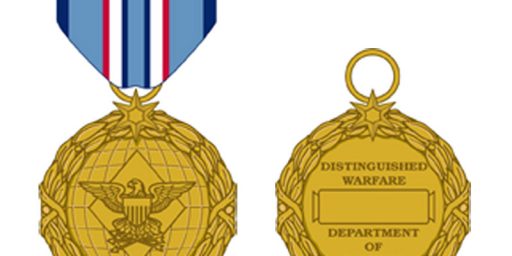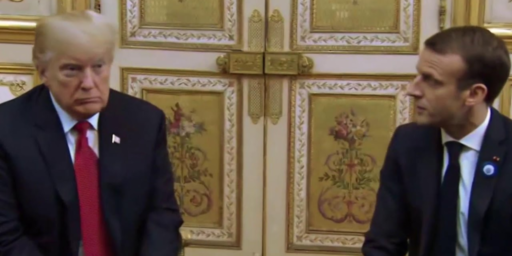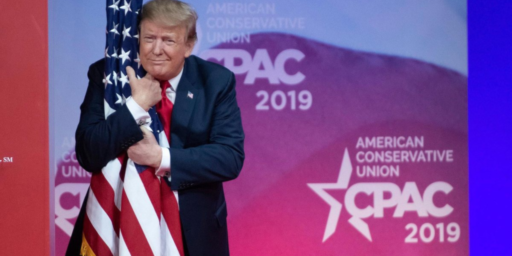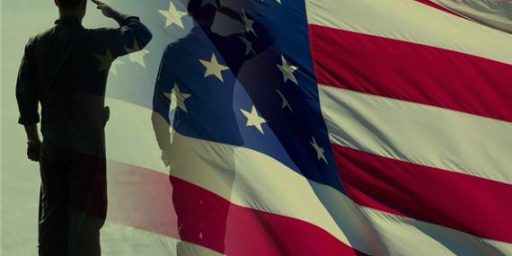Turning Heroes into Victims and Vice-Versa
The discussion about press corps patriotism — or, more precisely, the lack of it — sparked by Jonah Goldberg was somewhat fuzzy, focusing on the meaning of nationalism and the value of symbols. Robert Kaplan takes a sharper cut at it in today’s WSJ, focusing not so much on patriotism but heroism.
The media struggles in good faith to respect our troops, but too often it merely pities them. I am generalizing, of course. Indeed, there are regular, stellar exceptions, quite often in the most prominent liberal publications, from our best military correspondents. But exceptions don’t quite cut it amidst the barrage of “news,” which too often descends into therapy for those who are not fighting, rather than matter-of-fact stories related by those who are.
As one battalion commander complained to me, in words repeated by other soldiers and marines: “Has anyone noticed that we now have a volunteer Army? I’m a warrior. It’s my job to fight.” Every journalist has a different network of military contacts. Mine come at me with the following theme: We want to be admired for our technical proficiency–for what we do, not for what we suffer. We are not victims. We are privileged.
[…]
Media frenzies are ignited when American troops are either the perpetrators of acts resulting in victimhood, or are victims themselves. Meanwhile, individual soldiers daily performing complicated and heroic deeds barely fit within the strictures of news stories as they are presently defined. This is why the sporadic network and cable news features on heroic soldiers in Iraq and Afghanistan comes across as so hokey. After all, the last time such reports were considered “news” was during World War II and the Korean War.
In particular, there is Fox News’s occasional series on war heroes, whose apparent strangeness is a manifestation of the distance the media has traveled away from the nation-state in the intervening decades. Fox’s war coverage is less right-wing than it is simply old-fashioned, antediluvian almost. Fox’s commercial success may be less a factor of its ideological base than of something more primal: a yearning among a large segment of the public for a real national media once again–as opposed to an international one. Nationalism means patriotism, and patriotism requires heroes, not victims.
This comes much closer to the capturing the conflict than the Goldberg piece and gets at something more important: The disconnect between a professional military and the society it serves. Goldberg noted, for example, that Walter Cronkite and his fellows wore military uniforms as part of a war correspondents corps; that idea seems at best quaint and probably simply mindboggling today.
But while the attention is on the press corps, the same is true of society as a whole. We don’t know how to relate to the military because warfighting is now the unique province of a professional warrior caste. Both the press and the public naturally feel sorry for soldiers sent into unfriendly places far from home.
Further, our national psyche, shaped by Vietnam and Watergate and a cynical popular culture has long since rejected the idea of “good guys” and “bad guys.” While we still have the occasional “heroes,” we view the concept through jaundiced eyes.
Worse, we quite often conflate heroism and victimhood. Take, for example, those killed by terrorists in the September 11 attacks. They’re treated almost universally as heroes, with the Twin Towers dubbed as “hallowed ground.” Yet the vast majority of those who died that day were mere tragic victims; ordinary folks who just went to work that day to collect a paycheck and were murdered in a particularly public way. The heroes that day were the police officers and firefighters who risked their lives going into burning buildings to save others.
Kaplan also takes the macro view:
That medium is refractive because while the U.S. still has a national military, it no longer has a national media to quite the same extent. The media is increasingly representative of an international society, whose loyalty to a particular territory is more and more diluted. That international society has ideas to defend–ideas of universal justice–but little actual ground. And without ground to defend, it has little need of heroes. Thus, future news cycles will also be dominated by victims.
The media is but one example of the slow crumbling of the nation-state at the upper layers of the social crust–a process that because it is so gradual, is also deniable by those in the midst of it. It will take another event on the order of 9/11 or greater to change the direction we are headed. Contrary to popular belief, the events of 9/11–which are perceived as an isolated incident–did not fundamentally change our nation. They merely interrupted an ongoing trend toward the decay of nationalism and the devaluation of heroism.
It’s not clear to me that heroism has to die along with nationalism. My instinct is that Kaplan is wrong in his judgment that the trend toward cosmopolitanism and post-nationalism is reversible. While the trend is moving in the other direction in much of the developing world, with artificial nation-states devolving back into tribal entities, the prosperous democracies are becoming more intermingled. Europe is slowly but surely on its way to becoming a “United States of Europe” and the globalization of economics and security is inexorable.
Postscript: NPR ran a feature on today’s “Morning Edition” that was a classic case of the “soldiers as victims” schema described above. In “Guard Families Seek to Close Gap Left by Iraq,” John McChesney looked at the plight of the Minnesota National Guard’s 1st Brigade Combat Team, which recently returned from Iraq after a 22 month deployment. No mention was made of what they did while over there and no soldier proud of his service was heard from. Instead, the focus was “Families left behind struggle to put their lives back together.”
Laura Rosen links the piece approvingly and it is a well done piece of reporting. But it misses the larger point: These people chose their calling.
Nobody questions that soldiers going off to war face extreme hardship or that their families suffer in their absence. This doesn’t make them victims, however. It’s simply the nature of service. Treating these people as hapless victims who had no idea that their citizen-soldiers might one day actually have to use the skills they’d spent years training to acquire cheapens their sacrifice.
In a different context, Heather Hurlburt observes, “in my most recent bloggingheads.tv appearance: Eli Lake complained that ‘no one ever thanks the US’ — which is a great example of the above syndrome. I compared efforts in the international sphere to changing diapers — thankless, but part of the deal and not worth whining over.”
That’s the attitude of the vast majority of our soldiers serving in Iraq. They’re tired, they miss their families, and some substantial number of them doubtless think they’re fighting a losing cause. But they’re warriors, not victims, and they don’t want our pity.






I think there is also an element of the main stream media’s mono cultured lack of diversity in not knowing many people serving. I currently have two nephews serving. At our family reunion last summer, one of my cousins, who serves as a sergeant in the Marine Corps, gave a slide show of pictures from his recently completed tour in Iraq. My church weekly includes prayers for members or their children currently serving (about 1 person serving in the military for every 20 church goers). In short, I and a lot of people like me have direct contact with the “professional military class”. We may not be serving or have served, but we know a variety of people who have. We aren’t isolated from the watchmen on the walls.
James, with respect to the NPR story, which I listened to on my commute today, I would argue that there is a world of difference between volunteering for the Guard and serving in Iraq and volunteering for the Army or Marines and serving in Iraq. I would say that most people who signed up for the Guard did so without even contemplating the possibility that they might serve overseas. Prior to the Iraq War, most of the duties of the National Guard were things like helping out in disasters and incidents of civil disorder. I don’t think it’s right to lump the two of them together.
As to Kaplan’s points, well, I personally don’t see a problem with the decline of the nation-state, personally. Especially as concerns the western democracies becoming more integrated. I’m personally quite annoyed that I now need a passport to go to freaking CANADA….
How is this different than press treatment of any group. Look at stories about police, doctors, teachers in difficult schools, social workers etc etc. People in all of these groups are “daily performing complicated and heroic deeds barely fit within the strictures of news stories as they are presently defined.” The stories reported in the news are almost uniformly about exceptions rather than the rule. This is hardly limited to coverage of the military nor is it really new to news.
That is a truly mind boggling sentiment. By almost any measure Fox is more right-wing than old fashioned.
Being a shill for particular national policies is not the equivalent of being a real national media.
Spot on.
Its important to remember that, as part of its push for a war that would be hard to justify to the American people, the Bush administration worked diligently to ensure such isolation occurred. If the press looked too closely, if the people thought through the arguments presented by the Administration too well, the war would not have happened.
Prior to the invasion of Iraq, a majority of those in the media signed on as cheerleaders for the war. For example, according to the journalists in Knight Ridder, finding experts within the intelligence community, with direct knowledge of the false claims being made in regards to the aluminium tubes, was not hard to do. All it took was a phone call. The media in general decided not to make that call.
Goldberg’s beef is not why is the media failing in its support of the troops, its why have they stopped supporting the lies.
Responses
Indeed and that to some extent plays into the idea of soldiers as victims, because to the rest of us it seems they are really victims- victims of some inability to integrate into society on some level that leaves them alienated such that they choose to do things most of us find unimaginable if not repellant. That or that they are victims of a military that actively recruits through the use of psychological manipulation and outright lies.
To those who do not choose “to serve” that choice does indeed seem to be almost an unfortunate condition, like being born autistic. It seems like an indication of something deeply wrong in the person’s psyche.
Notice I repeatedly use the term “seems.” These are impressions, not facts. Nor are those impressions universal. Although there is a certain amount of frankly deserved scorn directed towards those who at least claim to understand and revere the military while choosing not to themselves (barring some real medical reason).
Not just mindboggling- utterly dangerous and irresponsible. The journalists are there to monitor the events (and by extenion the military) not to support them. A very important reason to put reporters in the warzone is to specifically to keep the leash on the hounds.
Now that’s true.
Why would you want to? What good has come from nationalism to balance out the endless evil?
As a poster above points out people in the national guard usually are joining to be a domestic emergency response force, not to be foreign invaders for years at a time. Maybe that just means they should have read the fine print, but in the near past they were more dealing with fires and floods than IEDs.
I am a 2 tour Vietnam Veteran who recently retired after 36 years of working in the Defense Industrial Complex on many of the weapons systems being used by our forces as we speak. I believed another Vietnam could be avoided with defined missions and the best armaments in the world.
It made no difference.
We have bought into the Military Industrial Complex (MIC). If you would like to read how this happens please see:
http://www.vanityfair.com/politics/features/2007/03/spyagency200703
Through a combination of public apathy and threats by the MIC we have let the SYSTEM get too large. It is now a SYSTEMIC problem and the SYSTEM is out of control. Government and industry are merging and that is very dangerous.
There is no conspiracy. The SYSTEM has gotten so big that those who make it up and run it day to day in industry and government simply are perpetuating their existance.
The politicians rely on them for details and recommendations because they cannot possibly grasp the nuances of the environment and the BIG SYSTEM.
So, the system has to go bust and then be re-scaled, fixed and re-designed to run efficiently and prudently, just like any other big machine that runs poorly or becomes obsolete or dangerous.
This situation will right itself through trauma. I see a government ENRON on the horizon, with an associated house cleaning.
The next president will come and go along with his appointees and politicos. The event to watch is the collapse of the MIC.
For more details see:
http://rosecoveredglasses.blogspot.com/2006/11/odyssey-of-armaments.html
Absolutely 100 percent correct, and we’d better fix it soon before the Military Industrial Complex feeding off an all professional military devours all of us instead.